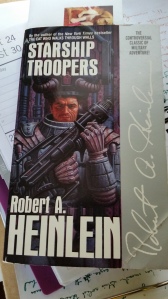Heinlein, Robert A. Starship Troopers. New York: Ace Books, 1987. First published by G.P. Putnam’s Sons, 1959.

I have become enamored of reading bad science fiction late at night when I am feeling anxious for whatever reason. In this case, the cat’s health issues over the past month have certainly been a constant source of stomach-churning fun.[1]
Short story shorter, a few weeks ago I found a copy of Starship Troopers in the Alex P— Immemorial Wing of the library. I’d recently had a discussion with my youngest brother about politics in literature, so I decided to take a little look through it. So let’s summarize the plot!
Juan “Johnnie” Rico is an immigrant from the Phillipines (or the area formerly known as) to the US (or the area—you get the idea—the book isn’t super specific about world geography in a lot of ways) who grows up in luxury, the son of a rich businessman. He’s living in a futuristic society (post-20th century, date not specified but seems pretty far into the future, since there’s faster-than-light travel and various other gadgets) in which military or other civil service is a prerequisite for becoming a full citizen (of what is referred to as the Federation). Most people don’t bother—you can live a perfectly fine life without becoming a citizen; the main drawback is that you don’t get to vote. Still, come their 18th birthdays, Johnnie, his best friend Carl, and a girl in his class named Carmen all go down to the Army/Navy office and sign up. Carmen, who is very good at math and has good reflexes, goes to piloting school. Carl, who we are led to believe is pretty smart, winds up in R&D. And Johnnie, who has no particular skills other than being a pretty engrossing narrator, joins the M.I., or Mobile Infantry. They are basically like the normal infantry, except they have rocket-powered jumpsuits that allow them to bound over a lot of terrain relatively quickly. This turns out to be something of a blessing in disguise for him, as he is able to gain discipline, martial skills, insight into why a person might become a soldier and why it’s important that only those who have served have the vote, and other pressing societal issues. After a while, the Federation gets into a war with the bug people. Juan makes up with his estranged father, then goes to officer training school and winds up as a lieutenant leading his own platoon.
Heinlein writes about military life with a certain familiarity—he went to the naval training academy himself, though he was discharged in the 1930s with TB and never saw combat. Still, his descriptions of boot camp have a vividness to them that will be somewhat familiar to anyone who has taken part in physically demanding activities.[2] In fact, while the book is set in the future, it’s a future that smells a lot like the 1950s. We have air cars, yes, as well as faster-than-light ships and an elaborate body armor for soldiers that enables them to fly, but people still read newspapers and receive telegrams, fill out forms by hand and receive paper letters. Perhaps more striking, all the fighting is done by boots on the ground rather than, for example, drones.[3] Of course, the book would not have been as exciting had our hero been training to fly drones rather than fight himself.
Philosophically speaking, there are a few other interesting points to be made. In many ways, Rico functions as a cog in a machine, and he implies that everyone in the army functions in the same way. This is, on the one hand, bureaucracy taken to its natural extreme; on the other hand, it’s confusing to think of an army where everyone has to fight, including people who might otherwise have incredibly important skills that would dictate that they should be kept alive (like code breakers/linguists/etc.). Interestingly, despite having many friends die in training and combat, Rico never questions 1) the training he is receiving, 2) the war he is fighting, or 3) the overall necessity for war (he sees it as a biological necessity based on the availability of habitat). And for all his pro-MI rhetoric, Rico never really gets a triumph. He succeeds in a lot of things, including rescuing his Buck Sergeant[4], a man called Zim, from the bugs, but he is injured during the rescue and doesn’t really recall all of it, negating and distancing him from what would otherwise have been quite a victory. In this way, Heinlein sort of acknowledges, obliquely, that while war may be rationalized with a variety of pretty, noble tropes, its actual execution is quite a bit uglier, and much less noble.
This book does a good job of developing the world in which it’s set gradually; by the time you get to the end, you’ve gotten a fairly good idea of what life in it is like, but Heinlein doesn’t rush to dump information on you at the beginning. The book also features a fair amount of diversity in terms of race compared to most science fiction. And, at least compared to Stranger in a Strange Land, Heinlein’s treatment of women here is much less aggravating; yes, Rico repeatedly remarks at how pretty women are, but he’s unable to get off with anyone—in general because all the women he meets are way smarter than he is. He’s not bitter about this, which is refreshing, and the women, as I mentioned, are genuinely intelligent and good at their jobs (c.f. the constant parade of large-breasted bimbos in SiaSL).
My brother, mentioned mere paragraphs ago, reads this book as a satire. His reasons for this seem to be rooted in a few things about the book–for example, the way the the “bugs” are dehumanized/caricatured and some things about the way the bureaucracy functions, as well as the fact that later on, Heinlein commended the author of The Forever War, Joe Halderman, on having written such a good novel, and The Forever War is widely regarded as being about its author’s experience during the Vietnam War (in Vietnamee, Kháng chiến chống Mỹ). Having read the book, I’m not sure I believe him; Heinlein is a competent writer and a good storyteller, but I don’t know if he’s good enough to pull off that kind of unflinching satire.
I think that’s about all I have to say about this one. I’m told there’s a film version, but I looked at the plot, and it looked like the director didn’t actually read the book so much as steal the character names/title. Interestingly, there are a lot of articles suggesting that the film version is satire. So there’s that.
Next time: Something with women in it.

[1] For those not following along on Facebook, the cat had an adenocarcinoma of the small intestine. She is currently doing well following a bowel resection, but the cancer isn’t really cured and will return, probably within the next six months. But there have been a few anxious nights, mostly because I’m still a hypochondriac.
[2] Like ultrarunning.
[3] Drones are weird, aren’t they? At any point in the last ten thousand years of human history right up to, oh, the mid-1990s, that war will always have to be fought by people was a reasonable assumption to make. Now the elimination of people from offensive combat could totally happen.
[4] Good luck figuring out the ranks discussed in the book. Lieutenant is higher than sergeant; that’s all I can tell you.

2 thoughts on “Starship Troopers, because why stop with the cheap scifi just when I’m hating myself?”
Comments are closed.